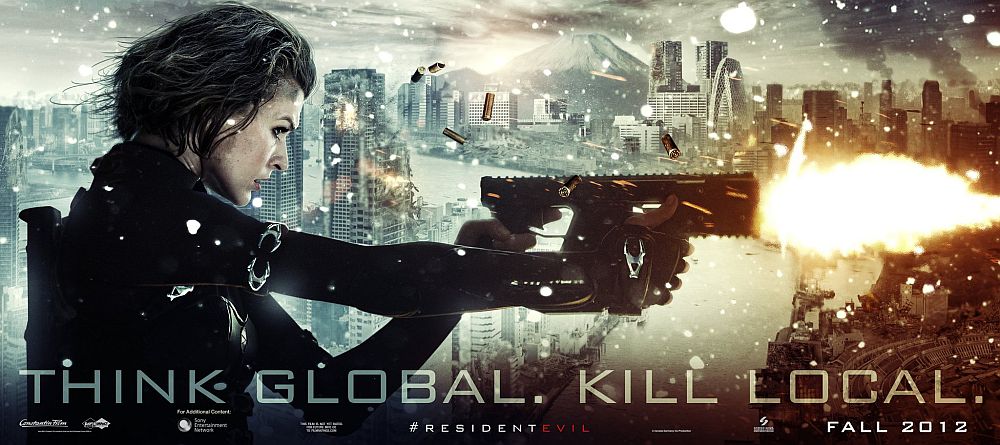 ★★★★
★★★★
“Games without frontiers.”
 While being (again) largely disappointed by the previous entry, Afterlife, I wrote: “There’s really only one reason we bother with this series: to see Milla Jovovich kicking righteous ass. Everything else is – or should be – secondary.” And that’s why this is the best Resident Evil movie in eight years. It may not be anything significant in the plot department. There are not hidden depths or great moments of character revelation. But it does contain entirely acceptable amounts of Milla Jovovich Kicking Righteous Ass, and succeeds as an entertainment spectacle, almost entirely due to this.
While being (again) largely disappointed by the previous entry, Afterlife, I wrote: “There’s really only one reason we bother with this series: to see Milla Jovovich kicking righteous ass. Everything else is – or should be – secondary.” And that’s why this is the best Resident Evil movie in eight years. It may not be anything significant in the plot department. There are not hidden depths or great moments of character revelation. But it does contain entirely acceptable amounts of Milla Jovovich Kicking Righteous Ass, and succeeds as an entertainment spectacle, almost entirely due to this.
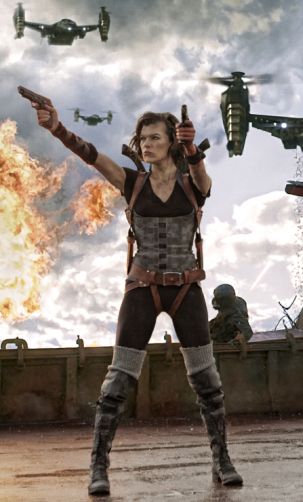 Though actually, this is almost a “greatest hits” package, especially in terms of participants. Not seen since the first film, are Rain Ocampo (Michelle Rodriguez) and James Shade (Colin Salmon). Apocalypse brought us Jill Valentine (Sienna Guillory) and Carlos Olivieira (oded Fehr), while Extinction introduced the audience to Claire Redfield (Ali Larter) and K-Mart (Spencer Locke). Finally, Afterlife was the debuts of Luther West (Boris Kodjoe) and Chris Redfield (Wentworth Miller). But they are all present for this fifth edition: though the focus is kept, as it should be, on Alice (Jovovich). The others all play their parts – notably Valentine, who is now a brainwashed toy of the Umbrella Corporation, out to hunt Alice down – but it’s the MJKRA show, all the way.
Though actually, this is almost a “greatest hits” package, especially in terms of participants. Not seen since the first film, are Rain Ocampo (Michelle Rodriguez) and James Shade (Colin Salmon). Apocalypse brought us Jill Valentine (Sienna Guillory) and Carlos Olivieira (oded Fehr), while Extinction introduced the audience to Claire Redfield (Ali Larter) and K-Mart (Spencer Locke). Finally, Afterlife was the debuts of Luther West (Boris Kodjoe) and Chris Redfield (Wentworth Miller). But they are all present for this fifth edition: though the focus is kept, as it should be, on Alice (Jovovich). The others all play their parts – notably Valentine, who is now a brainwashed toy of the Umbrella Corporation, out to hunt Alice down – but it’s the MJKRA show, all the way.
The series has had a tendency to end its entries with a wallop, right from the original, with Alice discovering the infection has escaped the Hive. Part 4 was no exception, with Alice and assorted survivors on a supertanker, only for an F-sized swarm of attack helicopter to hove into view, commanded by Valentine. This takes off from there, but begins with Alice plunging into the water, only to rewind in slow-motion to the arrival of the helicopters, then playing forward again. It’s a striking sequence, that certainly hits the ground running. It ends with Alice waking to find herself in a suburban house, with a husband and daughter…or is she? Turns out it’s all an Umbrella simulation: she has been captured, and they still want her, even if she’s no longer the superhuman she was.
There’s an unlikely ally, who releases Alice, and tells her she has two hours to meet up with a rescue team coming in to the under-Siberian complex from the outside, and get out of the place before it all goes boom. To do so, both she and they have to make their way through the various simulated arenas, designed to demonstrate the T-virus effects in Tokyo, Moscow, suburbia, etc. All the while, naturally, Valentine and her many, many Umbrella minions are on their respective tails. It could hardly be a more video-gamesque storyline, and is pretty scant. Still, in an action pic, it’s better to be too simple than too clever (I recently watched both The Raid: Redemption and Universal Soldier: Day of Reckoning, and will take dumb over aspirations to smart, any day!), providing you use the room freed up for plenty of MJKRA.
 It might be wise for Jovovich to contemplate retirement from the series. After all, she turned 37 earlier this month, and there are few things sadder than an action hero/ine desperately clinging on, past their prime (see also, Universal Soldier: Day of Reckoning). She’s not quite there yet, being still capable of holding her own, but there does seem to be rather more wirework and greenscreen-fu here than in previous editions. Director Anderson. a.k.a. Mr. Milla Jovovich distracts us by putting his wife in a costume whose S/M inspiration is so obvious, even another character comments on it. On the other hand, we could probably have done without the efforts to imbue Alice with some kind of maternal instincts [inevitably inviting comparisons with Aliens].
It might be wise for Jovovich to contemplate retirement from the series. After all, she turned 37 earlier this month, and there are few things sadder than an action hero/ine desperately clinging on, past their prime (see also, Universal Soldier: Day of Reckoning). She’s not quite there yet, being still capable of holding her own, but there does seem to be rather more wirework and greenscreen-fu here than in previous editions. Director Anderson. a.k.a. Mr. Milla Jovovich distracts us by putting his wife in a costume whose S/M inspiration is so obvious, even another character comments on it. On the other hand, we could probably have done without the efforts to imbue Alice with some kind of maternal instincts [inevitably inviting comparisons with Aliens].
The net result is something which doesn’t so much need to be watched, just simply pass in front of a receptive pair of eyeballs. As mentioned, there is not much new here, Anderson happy to recycle the best characters and monsters from the first four movies [though, regrettably, there are no zombie canines for Milla to engage in thigh-powered neck-snapping]. Certainly, it’s lazy film-making, but actually, that’s less of an insult than it sounds. It’s more like going round a friend’s house and he knows, without asking, to provide chips and beer. Sure, it can legitimately be described as lazy hospitality – but when this is just what you want, somehow it seems churlish to complain.
A sixth entry is already mooted, and Miila says that will be her last in the series [hang on: didn’t see say that after part 2?], with a reboot being considered by the producers beyond that. This decision may come as a surprise, if you look at the distinctly underwhelming US box-office figures: only $42 million, barely more than the original, even with a decade of inflation plus the cost of 3D tickets in its favor. However, as noted last time, the meat here is not North America, but overseas. This racked up more than $175 million there, easily enough to justify a further sequel. And, for the first time in a while, I am actually enthusiastic about the prospect: hopefully, Jovovich will go out with a bang like this one, not a whimper like the preceding two.
Dir: Paul W.S. Anderson
Star: Milla Jovovich, Sienna Guillory, Michelle Rodriguez, Ali Larter






















 Having been largely unimpressed by Iguchi’s other work, which seemed to have little to offer except megabytes of digital blood, I likely wouldn’t have watched this except an accident involving beer and my Apple TV remote has stopped me from much of my usual viewing. I could still stream from Netflix, however, though when I saw this was dubbed in English, I almost didn’t bother. But surprisingly, this has easily the best plot of his movies, with a slyly-twisted sense of imagination that’s very effective.
Having been largely unimpressed by Iguchi’s other work, which seemed to have little to offer except megabytes of digital blood, I likely wouldn’t have watched this except an accident involving beer and my Apple TV remote has stopped me from much of my usual viewing. I could still stream from Netflix, however, though when I saw this was dubbed in English, I almost didn’t bother. But surprisingly, this has easily the best plot of his movies, with a slyly-twisted sense of imagination that’s very effective.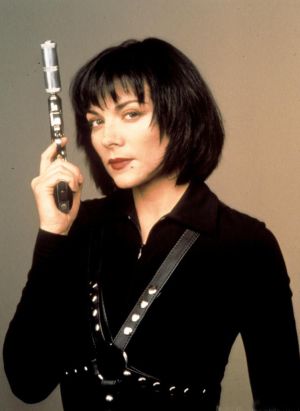 Agent Delilah (Cattrall) is undercover investigating arms dealer Alec Kasharian (Voyagis), and his connection to Palestinian terrorists [this was 1993, when people were concerned about such things]. At the behest of her handler Paul (Zane), she copies a floppy-disk containing vital information [I repeat, this was 1993, when an entire arms dealer’s business would apparently fit on a floppy!], but she’s discovered, shot multiple times, and left for dead. Paul drags her Swiss cheese-like body back to a secret government lab, where she is repaired, upgraded and generally enhanced in terms of speed, power and other abilities.
Agent Delilah (Cattrall) is undercover investigating arms dealer Alec Kasharian (Voyagis), and his connection to Palestinian terrorists [this was 1993, when people were concerned about such things]. At the behest of her handler Paul (Zane), she copies a floppy-disk containing vital information [I repeat, this was 1993, when an entire arms dealer’s business would apparently fit on a floppy!], but she’s discovered, shot multiple times, and left for dead. Paul drags her Swiss cheese-like body back to a secret government lab, where she is repaired, upgraded and generally enhanced in terms of speed, power and other abilities. Despite the name, there isn’t much raging, especially in the first half, which is more about the struggle for ownership of a company. It starts with an attack on the current chairman and his wife Bin (Ng) while on a trip to the Phillippines, after which she takes over the company. That doesn’t last long, as Tammy (Cheung) has designs on its finances, aiming to asset-strip it for his own purposes and divest Bin of her shareholding. To this end, he frames her and Chin (Leung), her best friend who is the wife of the company’s accountant, for drug smuggling: Chin takes the rap and is sent to 10 years jail. It takes all Bin’s resources to get her out, and when he does, Tammy sends his henchmen to kill their mother [ok, its not clear
Despite the name, there isn’t much raging, especially in the first half, which is more about the struggle for ownership of a company. It starts with an attack on the current chairman and his wife Bin (Ng) while on a trip to the Phillippines, after which she takes over the company. That doesn’t last long, as Tammy (Cheung) has designs on its finances, aiming to asset-strip it for his own purposes and divest Bin of her shareholding. To this end, he frames her and Chin (Leung), her best friend who is the wife of the company’s accountant, for drug smuggling: Chin takes the rap and is sent to 10 years jail. It takes all Bin’s resources to get her out, and when he does, Tammy sends his henchmen to kill their mother [ok, its not clear 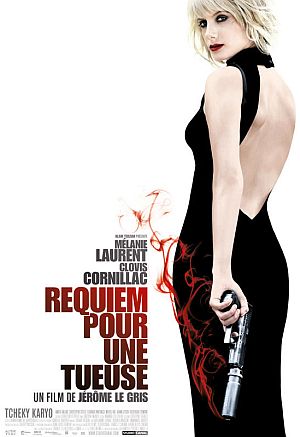 The French have a decent pedigree of action heroines, going back to Joan of Arc. Cinematically, the likes of Bloody Mallory, Adele Blanc-Sec, and one of the most influential of them all, Nikita, have kept the tricouleur flying. This is closest to the last-named, with Lucrece (Laurent) fed up of the assassin game, but talked into that old standby of the genre, one final mission, by her agent (Karyo, who of course was also in Nikita). This involves posing as a classical singer and taking part in a performance of Handel’s Messiah. For the target is the bass singer (Stills), whose Scottish distillery occupies land an oil company wants for their pipeline. Lucrece is pretty disenchanted with the whole thing, and this may explain why her early attempts mis-fire. Fortunately, the special agent (Cornillac) sent to track her down, is equally as unenthusiastic. But is Lucrece the only killer in play?
The French have a decent pedigree of action heroines, going back to Joan of Arc. Cinematically, the likes of Bloody Mallory, Adele Blanc-Sec, and one of the most influential of them all, Nikita, have kept the tricouleur flying. This is closest to the last-named, with Lucrece (Laurent) fed up of the assassin game, but talked into that old standby of the genre, one final mission, by her agent (Karyo, who of course was also in Nikita). This involves posing as a classical singer and taking part in a performance of Handel’s Messiah. For the target is the bass singer (Stills), whose Scottish distillery occupies land an oil company wants for their pipeline. Lucrece is pretty disenchanted with the whole thing, and this may explain why her early attempts mis-fire. Fortunately, the special agent (Cornillac) sent to track her down, is equally as unenthusiastic. But is Lucrece the only killer in play?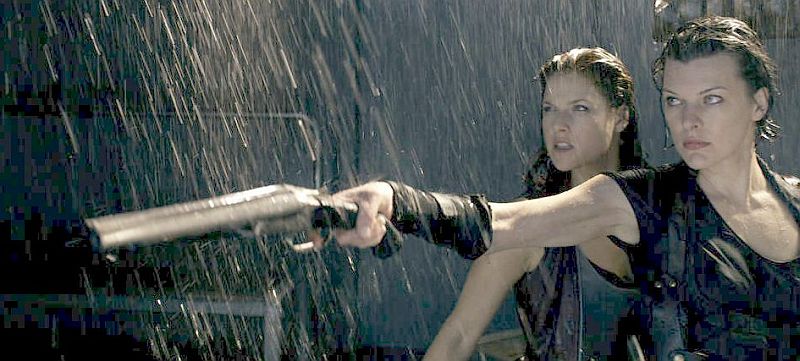
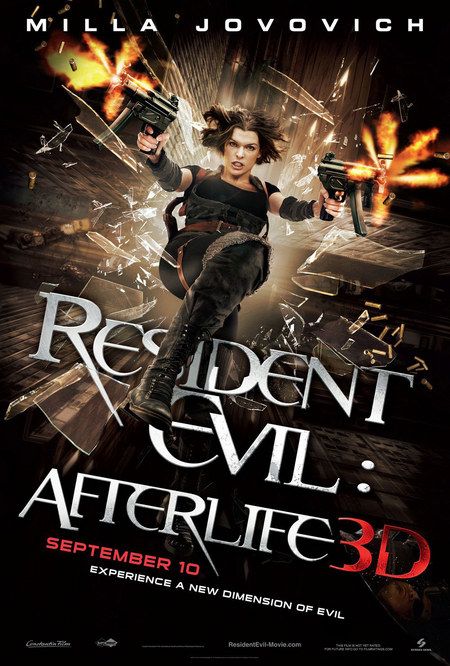 Milla Jovovich, coming at you in three dimensions! Unfortunately, Chris and 3D movies do not play well with each other – as we discovered at Avatar, where the resulting motion sickness had her staring at the back of the seat in front, after the first twenty minutes. She understandably declined all invitations to see Afterlife in this mode, so please note that with regard to this review, we’re strictly discussing the 2-D version. Other reports generally indicate the 3-D is pretty spiffy, having actually been shot that way, rather than being some hacked conversion job like certain movies I could mention [cough-ClashoftheTitans-cough]. That said, we move on.
Milla Jovovich, coming at you in three dimensions! Unfortunately, Chris and 3D movies do not play well with each other – as we discovered at Avatar, where the resulting motion sickness had her staring at the back of the seat in front, after the first twenty minutes. She understandably declined all invitations to see Afterlife in this mode, so please note that with regard to this review, we’re strictly discussing the 2-D version. Other reports generally indicate the 3-D is pretty spiffy, having actually been shot that way, rather than being some hacked conversion job like certain movies I could mention [cough-ClashoftheTitans-cough]. That said, we move on.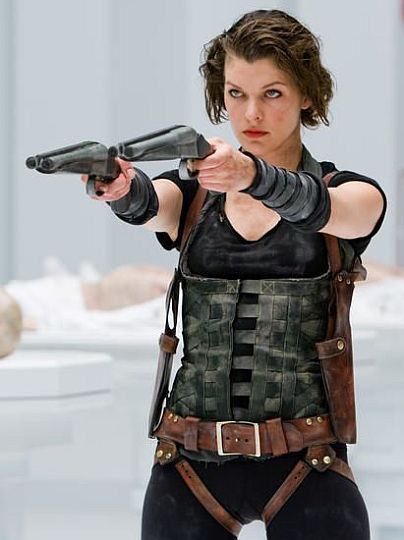 That turns out to be a red herring, but Alice does find Claire, albeit now controlled by an Umbrella device on her chest. Removing that, albeit at the cost of Claire’s memory, the pair fly back down the West coast, eventually locating a group of survivors bunkered down in an LA prison – Arcadia turns out to be the name of a boat, anchored just offshore. As the zombies break in, the survivors make their way towards the boat, with the help of a prisoner who turns out to be Chris (Miller), Claire’s brother. Reaching the Arcadia, they discover it’s a trap, designed to lure people to it for Umbrella’s research, with Wesker overseeing operations. He wants to assimilate (or “eat”) Alice; as the only person to successfully meld with the T-virus, he wants that ability to enhance his own superpowers.
That turns out to be a red herring, but Alice does find Claire, albeit now controlled by an Umbrella device on her chest. Removing that, albeit at the cost of Claire’s memory, the pair fly back down the West coast, eventually locating a group of survivors bunkered down in an LA prison – Arcadia turns out to be the name of a boat, anchored just offshore. As the zombies break in, the survivors make their way towards the boat, with the help of a prisoner who turns out to be Chris (Miller), Claire’s brother. Reaching the Arcadia, they discover it’s a trap, designed to lure people to it for Umbrella’s research, with Wesker overseeing operations. He wants to assimilate (or “eat”) Alice; as the only person to successfully meld with the T-virus, he wants that ability to enhance his own superpowers.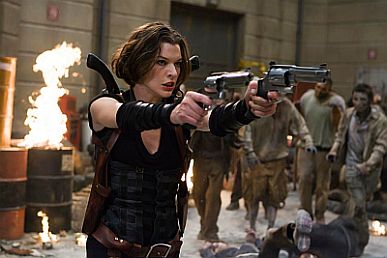 Which brings me nicely to the action, and it is, as usual for the series, solid, meaning this is, overall, just worth the 92 minutes of your time it will take up. I think due to the 3-D, the editing is more restrained than it has been of late; indeed, there’s probably as much slow-motion as anything else. I particularly liked Alice’s fondness for loading her shotgun with coins – again, I suspect largely for 3-D purposes. There’s a nice tag-match between her, Claire and the Executioner, but the final face-off versus Wesker is largely forgettable. As usual, the film ends on an interesting note: this time, it’s the return of a character last seen in Apocalypse, who makes a cameo early in the end-credits, and I wouldn’t mind seeing them return.
Which brings me nicely to the action, and it is, as usual for the series, solid, meaning this is, overall, just worth the 92 minutes of your time it will take up. I think due to the 3-D, the editing is more restrained than it has been of late; indeed, there’s probably as much slow-motion as anything else. I particularly liked Alice’s fondness for loading her shotgun with coins – again, I suspect largely for 3-D purposes. There’s a nice tag-match between her, Claire and the Executioner, but the final face-off versus Wesker is largely forgettable. As usual, the film ends on an interesting note: this time, it’s the return of a character last seen in Apocalypse, who makes a cameo early in the end-credits, and I wouldn’t mind seeing them return.

















 The most disappointing film of 2010? I went in with huge expectations, based on reviews that said, “The best swordplay film since Crouching Tiger, Hidden Dragon..” O RLY? I know Crouching Tiger. Crouching Tiger is one of my favourite movies. And Reign of Assassins, you’re no Crouching Tiger. It’s a confused, poorly-shot mess that proved a struggle to endure and a challenge to stay awake, right from the opening lump of introduction. Stick with me for this synopsis. The remains of a Buddhist monk, split in two, are said to turn whoever has them into a kung-fu master. The Dark Stone gang, under the Wheel King (Wang), want to possess them, and get one half, but gang member Drizzle makes off with the body parts, undergoes plastic surgery that turns her into Michelle Yeoh and takes up a quiet life as a fabric seller. She meets and marries Jiang Asheng (Jung), until her secret identity is revealed in a bank raid, and the Dark Stone gang come after her again. However, turns out Jiang isn’t who he seems either…
The most disappointing film of 2010? I went in with huge expectations, based on reviews that said, “The best swordplay film since Crouching Tiger, Hidden Dragon..” O RLY? I know Crouching Tiger. Crouching Tiger is one of my favourite movies. And Reign of Assassins, you’re no Crouching Tiger. It’s a confused, poorly-shot mess that proved a struggle to endure and a challenge to stay awake, right from the opening lump of introduction. Stick with me for this synopsis. The remains of a Buddhist monk, split in two, are said to turn whoever has them into a kung-fu master. The Dark Stone gang, under the Wheel King (Wang), want to possess them, and get one half, but gang member Drizzle makes off with the body parts, undergoes plastic surgery that turns her into Michelle Yeoh and takes up a quiet life as a fabric seller. She meets and marries Jiang Asheng (Jung), until her secret identity is revealed in a bank raid, and the Dark Stone gang come after her again. However, turns out Jiang isn’t who he seems either…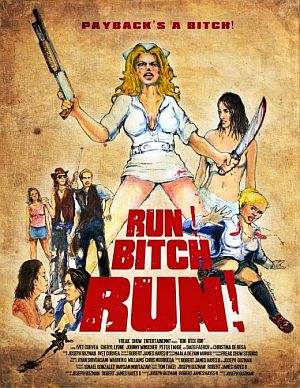 I can certainly appreciate where the makers are trying to go with this one. Two Catholic schoolgirls, selling Bible door-to-door to raise funds for their educational establishment. Unfortunately, they knock on the wrong door: this is actually a whorehouse, run by the psychotic Lobo (Tahoe), who has just killed one of his hookers. The two are kidnapped: one is killed, while the other (Lyone) is left for dead, naked, in the nearby woods. She is taken to hospital, but has only a single thought in her head: revenge. Stealing a nurse’s uniform, she checks out, intent on taking our her wrath on Lobo and his no-less depraved sidekicks.
I can certainly appreciate where the makers are trying to go with this one. Two Catholic schoolgirls, selling Bible door-to-door to raise funds for their educational establishment. Unfortunately, they knock on the wrong door: this is actually a whorehouse, run by the psychotic Lobo (Tahoe), who has just killed one of his hookers. The two are kidnapped: one is killed, while the other (Lyone) is left for dead, naked, in the nearby woods. She is taken to hospital, but has only a single thought in her head: revenge. Stealing a nurse’s uniform, she checks out, intent on taking our her wrath on Lobo and his no-less depraved sidekicks.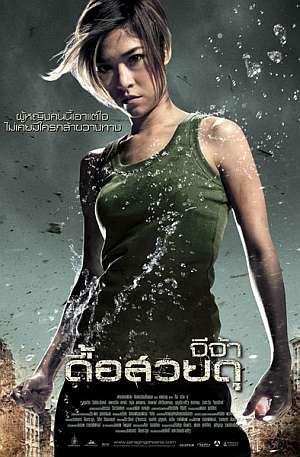 If you’ve seen Chocolate – starring the same lead actress, though confusingly billed under a different name here – you’ll know what to expect, and the film delivers much of the same. Which would be stunning, brutal fight scenes combined with moments of mind-numbing tedium. The plan for Yanin’s career seems to be to contrive methods by which she can avoid acting: last time it was autism; here, it’s a drunken style of kung-fu which helps mitigate a voice that might charitably be compared to broken nails on glass. She plays former rock-star(!) Deu, who is on the edge of being kidnapped, when she’s rescued by Sanim (Tang). He and his fellow masters of alcohol-fu have all lost ladies in their life to the kidnappers – who, it turns out, are doing this because… No. You wouldn’t believe me even if I told you – and are trying to locate their lair. Deu joins the team, and agrees to act as bait, to see if the kidnappers will go after her again.
If you’ve seen Chocolate – starring the same lead actress, though confusingly billed under a different name here – you’ll know what to expect, and the film delivers much of the same. Which would be stunning, brutal fight scenes combined with moments of mind-numbing tedium. The plan for Yanin’s career seems to be to contrive methods by which she can avoid acting: last time it was autism; here, it’s a drunken style of kung-fu which helps mitigate a voice that might charitably be compared to broken nails on glass. She plays former rock-star(!) Deu, who is on the edge of being kidnapped, when she’s rescued by Sanim (Tang). He and his fellow masters of alcohol-fu have all lost ladies in their life to the kidnappers – who, it turns out, are doing this because… No. You wouldn’t believe me even if I told you – and are trying to locate their lair. Deu joins the team, and agrees to act as bait, to see if the kidnappers will go after her again. The third in the series loses a lot of the loopy insanity that made the first one such a classic. Shiomi is still as kick-ass a heroine as ever, but I have to say, it was a severe struggle to remain conscious throughout, despite the brief 77-minute running time. By most accounts, the story is largely a re-tread of the second film, with Koryu Lee (Shiomi) going from Hong Kong to Yokohama, to track down a missing woman, only to find herself crossing paths, swords and a variety of other weapons, with local organized crime – since the target of her search is now the mistress of Oh Ryu Mei (Yamamoto). He pits wannabe warriors against each others in death matches, to decide who is fit to become a minion, only to find Lee is more than up to taking them on. He turns to freelancer Kurosaki (Kurata), who agrees to take out the unwanted snooper for twenty million yen.
The third in the series loses a lot of the loopy insanity that made the first one such a classic. Shiomi is still as kick-ass a heroine as ever, but I have to say, it was a severe struggle to remain conscious throughout, despite the brief 77-minute running time. By most accounts, the story is largely a re-tread of the second film, with Koryu Lee (Shiomi) going from Hong Kong to Yokohama, to track down a missing woman, only to find herself crossing paths, swords and a variety of other weapons, with local organized crime – since the target of her search is now the mistress of Oh Ryu Mei (Yamamoto). He pits wannabe warriors against each others in death matches, to decide who is fit to become a minion, only to find Lee is more than up to taking them on. He turns to freelancer Kurosaki (Kurata), who agrees to take out the unwanted snooper for twenty million yen.